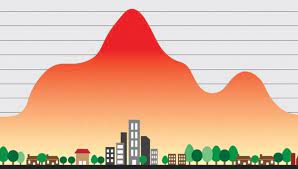What Is An Urban Heat Island?

Several parts of the country are reeling under heat wave conditions. Cities, especially, are a lot hotter than rural areas. This is due to a phenomenon called an “urban heat island”.
- An urban heat island is a local and temporary phenomenon experienced when certain pockets within a city experience higher heat load than surrounding or neighbouring areas on the same day.
- These are not the typical islands around water bodies, but urban heat islands that record higher day temperatures than other localities.
- The temperature variation can range between 3 to 5 degrees Celsius.
- For example, a greener locality like Pashan in Pune often records cooler temperatures than urban areas like Shivajinagar, Chinchwad or Magarpatta.
- The variations are mainly due to heat remaining trapped within locations that often resemble concrete jungles.
- Rural areas have relatively larger green cover in the form of plantations, farmlands, forests and trees as compared to urban spaces.
- This green cover plays a major role in regulating heat in its surroundings.
- Cities usually have buildings constructed with glass, bricks, cement and concrete — all of which are dark-coloured materials, meaning they attract and absorb higher heat content.




